Unit 2 Lesson 3 Making a difference 课件 (共24张PPT) 冀教版(2024)七年级下册
文档属性
| 名称 | Unit 2 Lesson 3 Making a difference 课件 (共24张PPT) 冀教版(2024)七年级下册 | 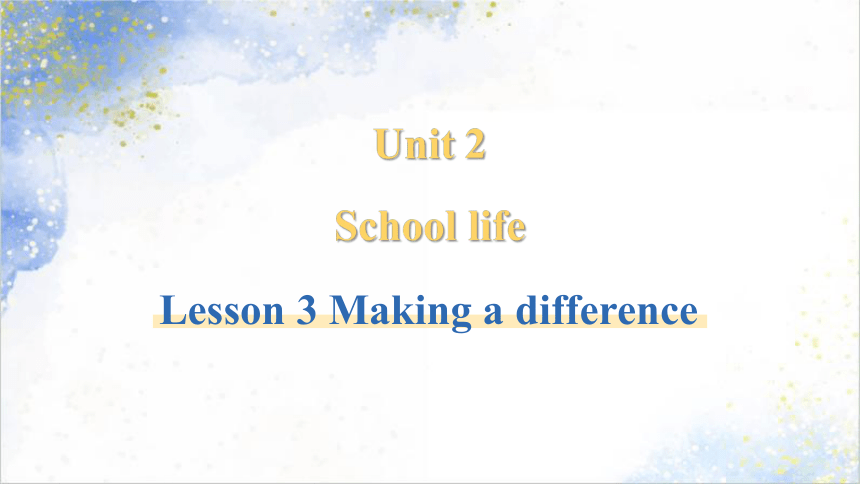 | |
| 格式 | pptx | ||
| 文件大小 | 1.3MB | ||
| 资源类型 | 教案 | ||
| 版本资源 | 冀教版 | ||
| 科目 | 英语 | ||
| 更新时间 | 2025-02-06 13:18:31 | ||
图片预览

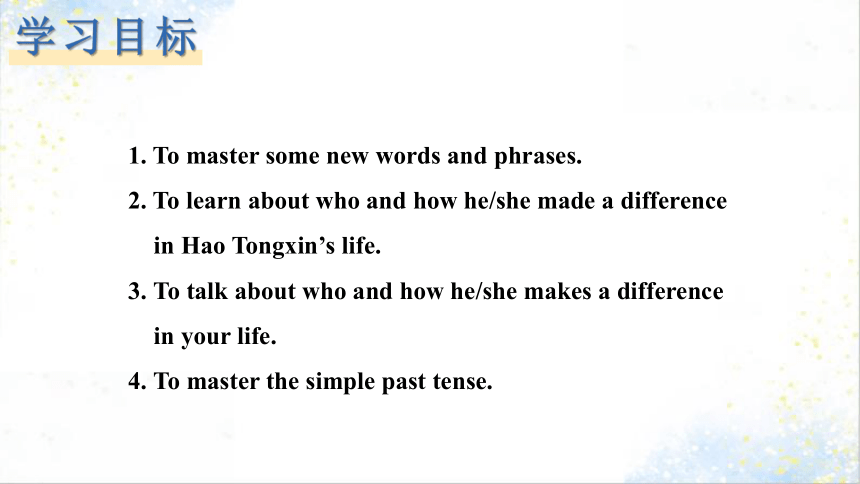
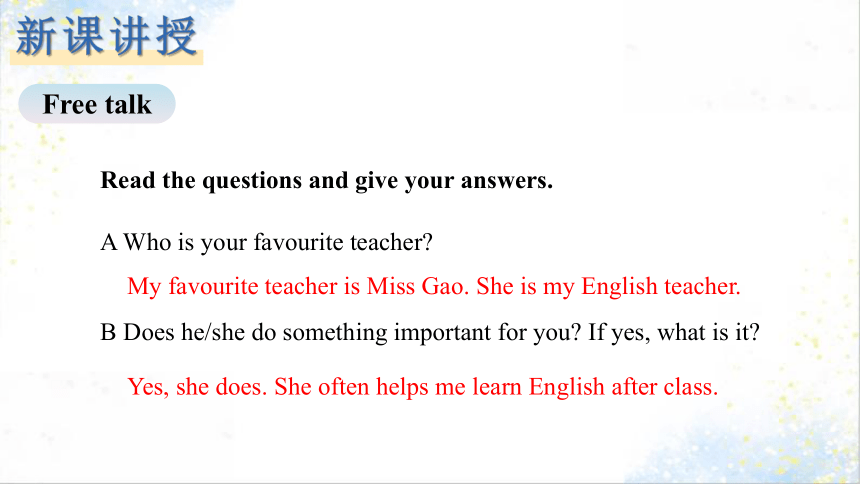
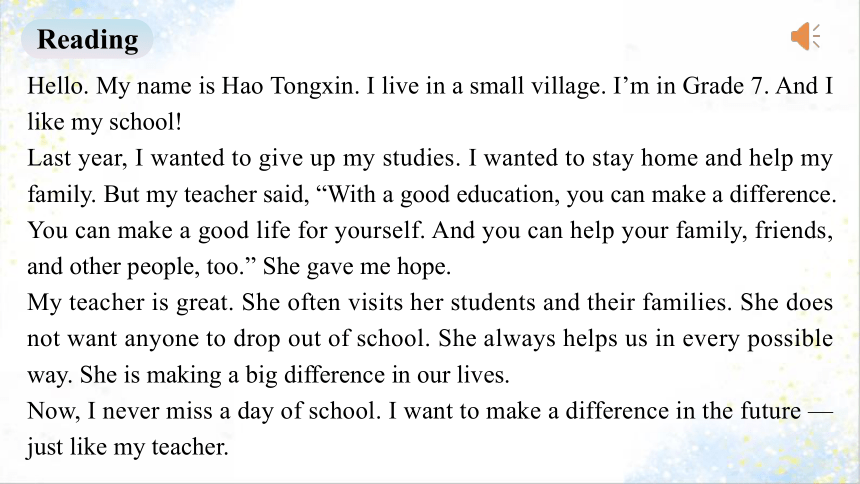
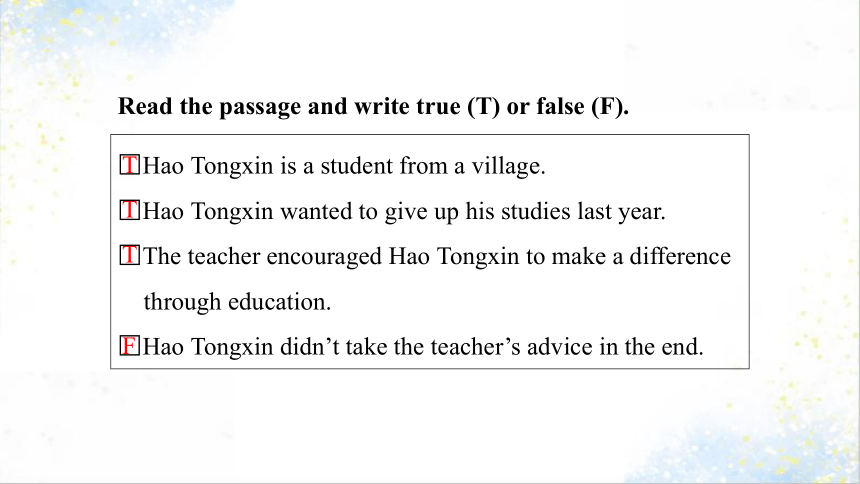
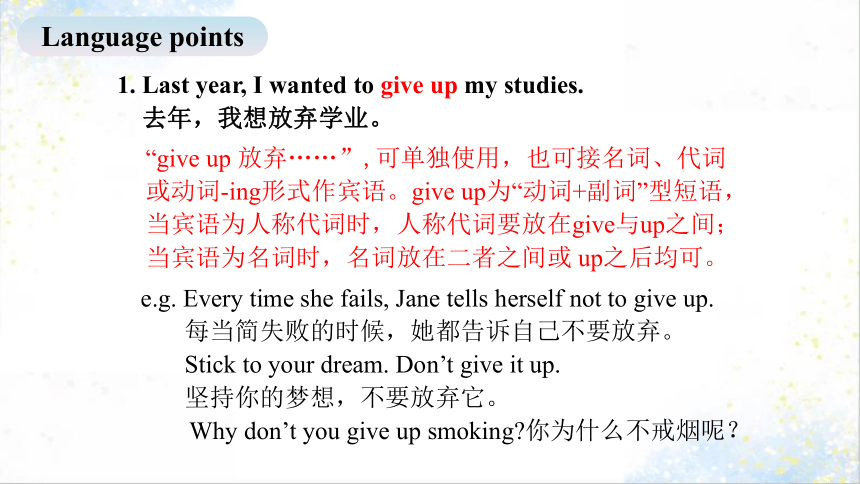
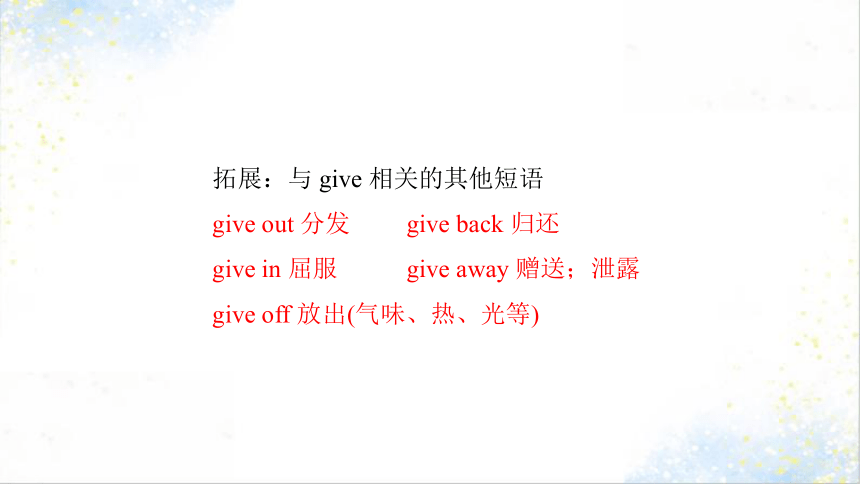
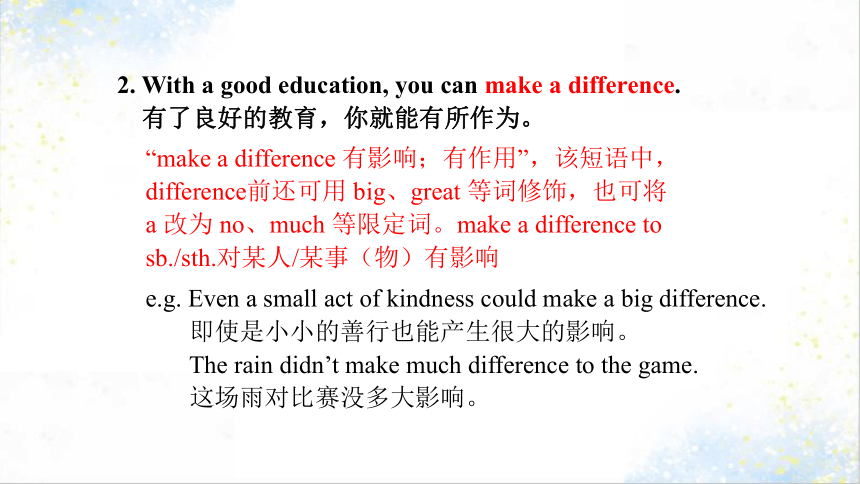
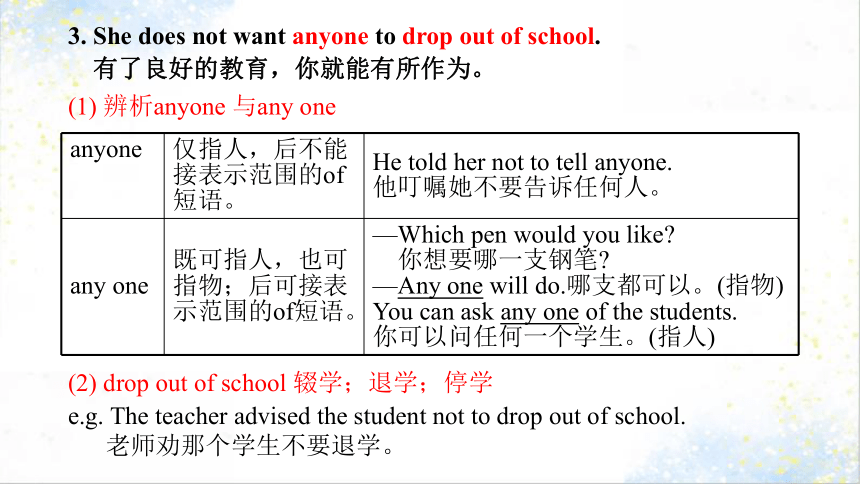
文档简介
(共24张PPT)
Unit 2
School life
Lesson 3 Making a difference
学习目标
1. To master some new words and phrases.
2. To learn about who and how he/she made a difference in Hao Tongxin’s life.
3. To talk about who and how he/she makes a difference in your life.
4. To master the simple past tense.
Free talk
新课讲授
Read the questions and give your answers.
A Who is your favourite teacher
B Does he/she do something important for you If yes, what is it
My favourite teacher is Miss Gao. She is my English teacher.
Yes, she does. She often helps me learn English after class.
Reading
Hello. My name is Hao Tongxin. I live in a small village. I’m in Grade 7. And I like my school!
Last year, I wanted to give up my studies. I wanted to stay home and help my family. But my teacher said, “With a good education, you can make a difference. You can make a good life for yourself. And you can help your family, friends, and other people, too.” She gave me hope.
My teacher is great. She often visits her students and their families. She does not want anyone to drop out of school. She always helps us in every possible way. She is making a big difference in our lives.
Now, I never miss a day of school. I want to make a difference in the future — just like my teacher.
Read the passage and write true (T) or false (F).
□Hao Tongxin is a student from a village.
□Hao Tongxin wanted to give up his studies last year.
□The teacher encouraged Hao Tongxin to make a difference through education.
□Hao Tongxin didn’t take the teacher’s advice in the end.
T
T
T
F
Language points
1. Last year, I wanted to give up my studies.
去年,我想放弃学业。
e.g. Every time she fails, Jane tells herself not to give up.
每当简失败的时候,她都告诉自己不要放弃。
Stick to your dream. Don’t give it up.
坚持你的梦想,不要放弃它。
Why don’t you give up smoking 你为什么不戒烟呢?
“give up 放弃……”,可单独使用,也可接名词、代词或动词-ing形式作宾语。give up为“动词+副词”型短语,当宾语为人称代词时,人称代词要放在give与up之间;当宾语为名词时,名词放在二者之间或 up之后均可。
拓展:与 give 相关的其他短语
give out 分发 give back 归还
give in 屈服 give away 赠送;泄露
give off 放出(气味、热、光等)
2. With a good education, you can make a difference.
有了良好的教育,你就能有所作为。
e.g. Even a small act of kindness could make a big difference.
即使是小小的善行也能产生很大的影响。
The rain didn’t make much difference to the game.
这场雨对比赛没多大影响。
“make a difference 有影响;有作用”,该短语中,difference前还可用 big、great 等词修饰,也可将 a 改为 no、much 等限定词。make a difference to sb./sth.对某人/某事(物)有影响
3. She does not want anyone to drop out of school.
有了良好的教育,你就能有所作为。
(1) 辨析anyone 与any one
anyone 仅指人,后不能接表示范围的of 短语。 He told her not to tell anyone.
他叮嘱她不要告诉任何人。
any one 既可指人,也可指物;后可接表示范围的of短语。 —Which pen would you like
你想要哪一支钢笔
—Any one will do.哪支都可以。(指物)
You can ask any one of the students.
你可以问任何一个学生。(指人)
e.g. The teacher advised the student not to drop out of school.
老师劝那个学生不要退学。
(2) drop out of school 辍学;退学;停学
4. She always helps us in every possible way.
她总是尽一切可能帮助我们。
e.g. It’s possible to work with our stress, rather than against it.
我们可以与压力共存,而不是对抗它。
(1) in every possible way 以各种可能的方式
(2) “possible / p s bl/ adj. 可能存在的;可能的”,其反义词为 impossible“不可能的”。常用结构有:①It’s possible (for sb.) to do sth. (对某人来说)做某事是可能的。②as...as possible (=as...as one can) 尽可能……;③if possible ( = if it is possible) 如果可能的话
5. I want to make a difference in the future — just like my teacher.
我想在未来有所作为,就像我的老师一样。
e.g. She dreams of becoming a famous writer in the future.
她梦想将来成为一名著名的作家。
in the future 在未来
6. Hao Tongxin didn’t take the teacher’s advice in the end. 郝同欣最终没有听从老师的建议。
e.g. You should take your teacher’s advice and study harder
for the exam.
你应该采纳你老师的建议,为考试更加努力学习。
e.g. I’m sure he’ll succeed in the end.
我肯定他最终会成功。
(1) take (one’s) advice 接受/采纳(某人的)建议
(2) in the end 最后,最终
Practice
Fill in the blanks with the correct forms of the phrases.
drop out of in the future give up make a difference
A Our teachers want us to get a good education. They don’t want us to__________________school.
B Don’t__________________hope. We know you can do it.
C Science is__________________in our lives.
D He wants to be a doctor and help sick people___________.
drop out of
give up
making a differences
in the future
Grammar Focus
一般过去时
基本用法
①表示过去某个时间或某一段时间内发生的动作或存在的状态,常和表示过去的时间状语连用,如:一段时间+ago、yesterday、yesterday morning/afternoon、last night/week/month/year、the day before yesterday (前天)、just now(刚才)、in+过去的时间(如in 2024)等。
e.g. I bought this coat last month.我是上个月买的这件外套。
I was born in 1998.我是1998 年出生的。
②表示过去经常或反复发生的动作,常和often、always等表示频度的词语连用。
e.g. In ancient times, Chinese people often used willow branches as gifts when they said goodbye to their friends.
在古代,中国人与朋友告别时常常用柳枝作为礼物。
句式结构
1. 肯定句:主语+was/were+其他.
主语+动词过去式+其他.
e.g. I was in Beijing last month.我上个月在北京。
I went to Shanghai last Friday. 我上周五去了上海。
2. 否定句:主语+was/were +not +其他.
主语+didn’t+动词原形+其他.
e.g. I wasn’t in Beijing last month.我上个月不在北京。
I didn’t go to Shanghai last Friday. 我上周五没去上海。
3. 一般疑问句及回答:Was/Were +主语+其他
肯定回答:Yes, was/were.
否定回答:No, 主语+wasn’t/weren’t.
Did+主语+动词原形+其他
肯定回答:Yes, 主语+ did.
否定回答:No, 主语+didn’t.
e.g. —Were you in Beijing last month 你上个月在北京吗
—Yes, I was. /No, I wasn’t.是的,我在。/不,我不在。
—Did you go to Shanghai last Friday 你上周五去了上海吗
—Yes, I did./No, I didn’t. 是的,我去了。/不,我没去。
一般过去时与一般现在时的区别
①用法不同
一般过去时表示过去某个时间发生的动作或存在的状态,或过去经常反复发生的动作;一般现在时表示经常发生或习惯性的动作或现在的状态。
e.g. I played badminton with my father last weekend.
我上周末和爸爸一起打羽毛球了。
I often play badminton with my father.
我经常和爸爸一起打羽毛球。
②时间状语不同
一般过去时常与表示过去的时间状语连用,如last week、yesterday、two days ago、last month 等;一般现在时常与表示现在的时间状语连用,如 now、every day等。
e.g. The farmer lost his horse last week.
这个农夫上个星期丢了马。
We read English every morning.
我们每天早上读英语。
③谓语动词不同
一般过去时的谓语动词使用过去式,没有人称和数的变化 (was和were 除外);一般现在时的谓语动词有人称和数的变化。第三人称单数作主语时,谓语动词用第三人称单数形式(be动词用is);其他人称作主语时,则用动词原形(be动词用am或are)。
e.g. He waited for a few hours and grew very angry.
他等了几个小时,变得非常生气。
Were they friendly to you 他们对你友好吗
My mother enjoys reading and I enjoy travelling.
我妈妈喜欢阅读,而我喜欢旅行。
The story is very interesting.这个故事非常有趣。
Practice
Read and pay attention to the parts in yellow. Then rewrite the sentences.
Last year, I wanted to give up my studies.
She often visits her students and their families.
A I want to stay home and help my family. (last year)
→ I wanted to stay home and help my family last year.
B Everyone works very hard in the sports events. (yesterday)
→__________________________________________________________
C I never miss a day of school. (last term)
→__________________________________________________________
D Lily plays ping-pong with her father. (last Sunday)
→__________________________________________________________
Everyone worked very hard in the sports events yesterday.
I never missed a day of school last term.
Lily played ping-pong with her father last Sunday.
Speaking
Who made a difference in your life How did he/she help you Talk about it.
My teacher made a difference in my life. She helped me after class, and she encouraged me...
My English teacher made a difference in my life. She helped me after class. My English was poor and I used to be afraid to speak English in public. But she encouraged me to practice every day. She is always patient with me. With her help, my English is better. Now English is my favourite subject.
当堂检测
一、根据汉语意思完成句子
1. 你要么冒险继续等待, 要么现在就放弃。
You can either take risks to keep on waiting or _______ _______ now.
2. 我们从来不想辍学, 因为教育是我们未来成功的关键。
We never want to _______ _______ _______ _______, as education is the key to our future success.
3. ——约翰, 你能告诉我你将来要做什么吗?
——我想成为一名足球运动员。
— John, can you tell me what you will do _______ _______ _______
— I want to be a football player.
4. 为了提前完成任务, 团队以各种可能的方式努力工作。
To finish the task ahead of time, the team worked hard _______ _______ _______ _______ .
give up
drop out of school
in the future
in every possible way
二、按要求完成句子
1. I like playing basketball. (改为一般过去时)
I _________ playing basketball when I was fifteen.
2. They read the poems last night. (改为否定句)
They _________ _________ the poems last night
3. The girl watched TV at home. (改为一般疑问句并作肯定回答)
— _________ the girl _________ TV at home
— Yes, _________ _________.
4. She was a good class monitor. (改为否定句)
She _________ a good class monitor.
5. My parents were at home yesterday. (改为一般疑问句并作否定回答)
—_________ your parents at home yesterday
—_________, _________ _________.
liked
didn’t read
Did watch
she did
wasn’t
Were
No they weren’t
Unit 2
School life
Lesson 3 Making a difference
学习目标
1. To master some new words and phrases.
2. To learn about who and how he/she made a difference in Hao Tongxin’s life.
3. To talk about who and how he/she makes a difference in your life.
4. To master the simple past tense.
Free talk
新课讲授
Read the questions and give your answers.
A Who is your favourite teacher
B Does he/she do something important for you If yes, what is it
My favourite teacher is Miss Gao. She is my English teacher.
Yes, she does. She often helps me learn English after class.
Reading
Hello. My name is Hao Tongxin. I live in a small village. I’m in Grade 7. And I like my school!
Last year, I wanted to give up my studies. I wanted to stay home and help my family. But my teacher said, “With a good education, you can make a difference. You can make a good life for yourself. And you can help your family, friends, and other people, too.” She gave me hope.
My teacher is great. She often visits her students and their families. She does not want anyone to drop out of school. She always helps us in every possible way. She is making a big difference in our lives.
Now, I never miss a day of school. I want to make a difference in the future — just like my teacher.
Read the passage and write true (T) or false (F).
□Hao Tongxin is a student from a village.
□Hao Tongxin wanted to give up his studies last year.
□The teacher encouraged Hao Tongxin to make a difference through education.
□Hao Tongxin didn’t take the teacher’s advice in the end.
T
T
T
F
Language points
1. Last year, I wanted to give up my studies.
去年,我想放弃学业。
e.g. Every time she fails, Jane tells herself not to give up.
每当简失败的时候,她都告诉自己不要放弃。
Stick to your dream. Don’t give it up.
坚持你的梦想,不要放弃它。
Why don’t you give up smoking 你为什么不戒烟呢?
“give up 放弃……”,可单独使用,也可接名词、代词或动词-ing形式作宾语。give up为“动词+副词”型短语,当宾语为人称代词时,人称代词要放在give与up之间;当宾语为名词时,名词放在二者之间或 up之后均可。
拓展:与 give 相关的其他短语
give out 分发 give back 归还
give in 屈服 give away 赠送;泄露
give off 放出(气味、热、光等)
2. With a good education, you can make a difference.
有了良好的教育,你就能有所作为。
e.g. Even a small act of kindness could make a big difference.
即使是小小的善行也能产生很大的影响。
The rain didn’t make much difference to the game.
这场雨对比赛没多大影响。
“make a difference 有影响;有作用”,该短语中,difference前还可用 big、great 等词修饰,也可将 a 改为 no、much 等限定词。make a difference to sb./sth.对某人/某事(物)有影响
3. She does not want anyone to drop out of school.
有了良好的教育,你就能有所作为。
(1) 辨析anyone 与any one
anyone 仅指人,后不能接表示范围的of 短语。 He told her not to tell anyone.
他叮嘱她不要告诉任何人。
any one 既可指人,也可指物;后可接表示范围的of短语。 —Which pen would you like
你想要哪一支钢笔
—Any one will do.哪支都可以。(指物)
You can ask any one of the students.
你可以问任何一个学生。(指人)
e.g. The teacher advised the student not to drop out of school.
老师劝那个学生不要退学。
(2) drop out of school 辍学;退学;停学
4. She always helps us in every possible way.
她总是尽一切可能帮助我们。
e.g. It’s possible to work with our stress, rather than against it.
我们可以与压力共存,而不是对抗它。
(1) in every possible way 以各种可能的方式
(2) “possible / p s bl/ adj. 可能存在的;可能的”,其反义词为 impossible“不可能的”。常用结构有:①It’s possible (for sb.) to do sth. (对某人来说)做某事是可能的。②as...as possible (=as...as one can) 尽可能……;③if possible ( = if it is possible) 如果可能的话
5. I want to make a difference in the future — just like my teacher.
我想在未来有所作为,就像我的老师一样。
e.g. She dreams of becoming a famous writer in the future.
她梦想将来成为一名著名的作家。
in the future 在未来
6. Hao Tongxin didn’t take the teacher’s advice in the end. 郝同欣最终没有听从老师的建议。
e.g. You should take your teacher’s advice and study harder
for the exam.
你应该采纳你老师的建议,为考试更加努力学习。
e.g. I’m sure he’ll succeed in the end.
我肯定他最终会成功。
(1) take (one’s) advice 接受/采纳(某人的)建议
(2) in the end 最后,最终
Practice
Fill in the blanks with the correct forms of the phrases.
drop out of in the future give up make a difference
A Our teachers want us to get a good education. They don’t want us to__________________school.
B Don’t__________________hope. We know you can do it.
C Science is__________________in our lives.
D He wants to be a doctor and help sick people___________.
drop out of
give up
making a differences
in the future
Grammar Focus
一般过去时
基本用法
①表示过去某个时间或某一段时间内发生的动作或存在的状态,常和表示过去的时间状语连用,如:一段时间+ago、yesterday、yesterday morning/afternoon、last night/week/month/year、the day before yesterday (前天)、just now(刚才)、in+过去的时间(如in 2024)等。
e.g. I bought this coat last month.我是上个月买的这件外套。
I was born in 1998.我是1998 年出生的。
②表示过去经常或反复发生的动作,常和often、always等表示频度的词语连用。
e.g. In ancient times, Chinese people often used willow branches as gifts when they said goodbye to their friends.
在古代,中国人与朋友告别时常常用柳枝作为礼物。
句式结构
1. 肯定句:主语+was/were+其他.
主语+动词过去式+其他.
e.g. I was in Beijing last month.我上个月在北京。
I went to Shanghai last Friday. 我上周五去了上海。
2. 否定句:主语+was/were +not +其他.
主语+didn’t+动词原形+其他.
e.g. I wasn’t in Beijing last month.我上个月不在北京。
I didn’t go to Shanghai last Friday. 我上周五没去上海。
3. 一般疑问句及回答:Was/Were +主语+其他
肯定回答:Yes, was/were.
否定回答:No, 主语+wasn’t/weren’t.
Did+主语+动词原形+其他
肯定回答:Yes, 主语+ did.
否定回答:No, 主语+didn’t.
e.g. —Were you in Beijing last month 你上个月在北京吗
—Yes, I was. /No, I wasn’t.是的,我在。/不,我不在。
—Did you go to Shanghai last Friday 你上周五去了上海吗
—Yes, I did./No, I didn’t. 是的,我去了。/不,我没去。
一般过去时与一般现在时的区别
①用法不同
一般过去时表示过去某个时间发生的动作或存在的状态,或过去经常反复发生的动作;一般现在时表示经常发生或习惯性的动作或现在的状态。
e.g. I played badminton with my father last weekend.
我上周末和爸爸一起打羽毛球了。
I often play badminton with my father.
我经常和爸爸一起打羽毛球。
②时间状语不同
一般过去时常与表示过去的时间状语连用,如last week、yesterday、two days ago、last month 等;一般现在时常与表示现在的时间状语连用,如 now、every day等。
e.g. The farmer lost his horse last week.
这个农夫上个星期丢了马。
We read English every morning.
我们每天早上读英语。
③谓语动词不同
一般过去时的谓语动词使用过去式,没有人称和数的变化 (was和were 除外);一般现在时的谓语动词有人称和数的变化。第三人称单数作主语时,谓语动词用第三人称单数形式(be动词用is);其他人称作主语时,则用动词原形(be动词用am或are)。
e.g. He waited for a few hours and grew very angry.
他等了几个小时,变得非常生气。
Were they friendly to you 他们对你友好吗
My mother enjoys reading and I enjoy travelling.
我妈妈喜欢阅读,而我喜欢旅行。
The story is very interesting.这个故事非常有趣。
Practice
Read and pay attention to the parts in yellow. Then rewrite the sentences.
Last year, I wanted to give up my studies.
She often visits her students and their families.
A I want to stay home and help my family. (last year)
→ I wanted to stay home and help my family last year.
B Everyone works very hard in the sports events. (yesterday)
→__________________________________________________________
C I never miss a day of school. (last term)
→__________________________________________________________
D Lily plays ping-pong with her father. (last Sunday)
→__________________________________________________________
Everyone worked very hard in the sports events yesterday.
I never missed a day of school last term.
Lily played ping-pong with her father last Sunday.
Speaking
Who made a difference in your life How did he/she help you Talk about it.
My teacher made a difference in my life. She helped me after class, and she encouraged me...
My English teacher made a difference in my life. She helped me after class. My English was poor and I used to be afraid to speak English in public. But she encouraged me to practice every day. She is always patient with me. With her help, my English is better. Now English is my favourite subject.
当堂检测
一、根据汉语意思完成句子
1. 你要么冒险继续等待, 要么现在就放弃。
You can either take risks to keep on waiting or _______ _______ now.
2. 我们从来不想辍学, 因为教育是我们未来成功的关键。
We never want to _______ _______ _______ _______, as education is the key to our future success.
3. ——约翰, 你能告诉我你将来要做什么吗?
——我想成为一名足球运动员。
— John, can you tell me what you will do _______ _______ _______
— I want to be a football player.
4. 为了提前完成任务, 团队以各种可能的方式努力工作。
To finish the task ahead of time, the team worked hard _______ _______ _______ _______ .
give up
drop out of school
in the future
in every possible way
二、按要求完成句子
1. I like playing basketball. (改为一般过去时)
I _________ playing basketball when I was fifteen.
2. They read the poems last night. (改为否定句)
They _________ _________ the poems last night
3. The girl watched TV at home. (改为一般疑问句并作肯定回答)
— _________ the girl _________ TV at home
— Yes, _________ _________.
4. She was a good class monitor. (改为否定句)
She _________ a good class monitor.
5. My parents were at home yesterday. (改为一般疑问句并作否定回答)
—_________ your parents at home yesterday
—_________, _________ _________.
liked
didn’t read
Did watch
she did
wasn’t
Were
No they weren’t
同课章节目录
